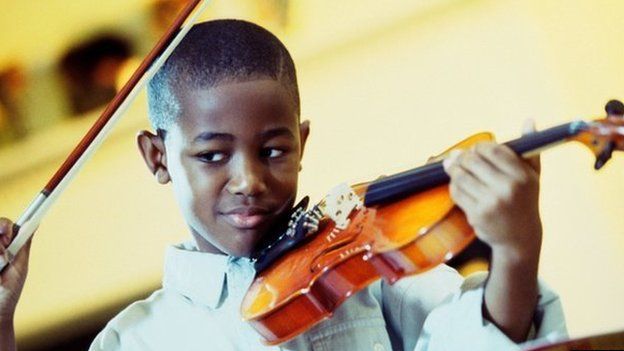Music 'could face extinction' in secondary schools
- Published
- comments

Music "could face extinction" as a subject in secondary schools in England, researchers have warned.
They say music is being squeezed because of pressure on pupils to take subjects included in the EBacc school league table measure.
Almost two thirds of 650 state school teachers, surveyed by Sussex University researchers, said the EBacc meant fewer students were taking GCSE music.
Ministers say the EBacc helps ensure children receive a rigorous education.
The English Baccalaureate or EBacc was brought in by the coalition government in 2010 for pupils achieving GCSE grade C or better in English, maths, the sciences, a language and geography or history.
The percentages of pupils entering and achieving the EBacc are among several measures used by government to determine a school's performance.
Stifling the arts?
Government figures show the proportion of GCSE candidates in state-funded schools who took the EBacc subjects rose from 22% in 2010 to almost 40% last year.
But critics say this increase has come at the expense of the arts, with just 47.9% of pupils being entered for at least one arts subject in 2016, down from 49.6% the previous year.
Researchers, from Sussex University's School of Education and Social Work, surveyed secondary music teachers at 657 state and 48 private schools across England over five years.
Staff at about 60% of the state schools specifically mentioned the EBacc as causing a negative effect on the provision and uptake of music at their school, while just 3% believed it had benefitted the subject.
In the five years to 2016-17 the schools in the survey entered fewer students for music qualifications, with:
- schools offering Music BTEC level 2 falling from 166 in 2012-13 to just 50 in 2016-17
- and the number offering music GCSE falling by six percentage points - from 85% in 2012-13 to 79% in 2016-17.
For students aged 13 to 14, the study found:
- music was compulsory in 84% of schools in 2012-13
- but by 2016-17 this figure had fallen to 62%.
In terms of staffing, 39% of the teachers surveyed reported cuts to music staff numbers, while 17% reported increases.
In 30% of secondary schools the music department consisted of just one teacher, up from 22% five years ago, the survey found.
"Music as a subject could be facing extinction," warned co-author Dr Ally Daubney.
The other co-author, senior lecturer Duncan Mackrill, said the future of the subject was "precariously balanced".
He urged the government to take action "to prevent the further erosion of music in secondary schools, before we lose the subject in some schools for good".
The Nasuwt teachers' union said its own research showed that subject choices and time for non-EBacc subjects, including music, were being restricted, with specialist teachers having their hours cut, being made redundant or not being replaced when they left.
"Increasingly, where music lessons or activities are offered by schools, these are at a charge, thereby restricting access only to those children whose families can afford to pay," said Nasuwt general secretary Chris Keates.
Deborah Annetts, chief executive of the Incorporated Society of Musicians, called the research "hugely important", urging ministers "to listen to the evidence and drop the EBacc before any more damage is done".
A Department for Education spokeswoman said ministers expected schools to offer subjects in addition to the EBacc so pupils had the opportunity to study areas reflecting their own individual interests and strengths.
The spokeswoman cited separate findings last month, from the New Schools Network lobby group, that the EBacc had not negatively affected entries for arts GCSEs.
"Music and the arts are key to a well-rounded education, which is why in November 2016 we announced a package of funding that will increase pupils' access to music and cultural education. This includes £300 million for music education hubs for 2016-20," said the spokeswoman.
- Published18 November 2016
- Published11 June 2015
- Published18 February 2015